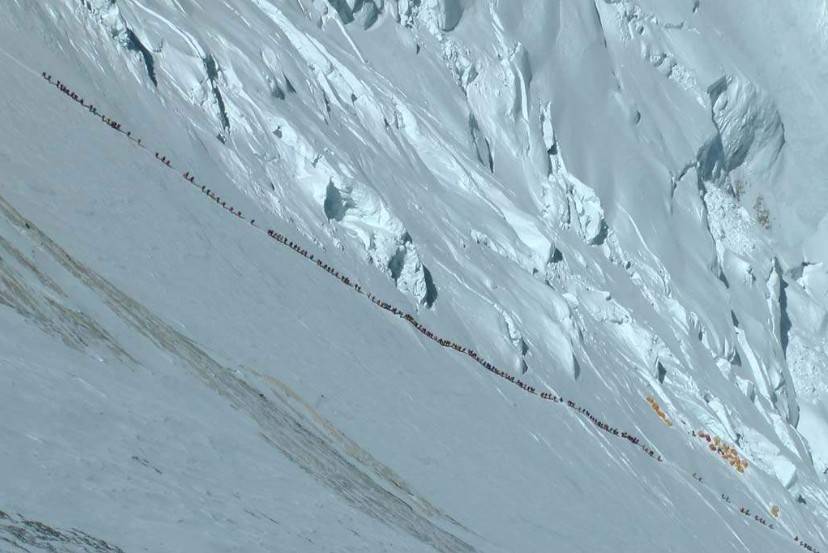May 2013
This week marked 60 years since human beings first set foot on the summit of Mount Everest – an expedition led by my great-uncle, John Hunt. He died 15 years ago, but was a towering figure on the fringes of my childhood, full of nephew-delighting tales of weird howls above the wind and finding enormous footprints in the snow around his tent: evidence, surely, of the yeti. His house was crammed with souvenirs from a lifetime of adventures, and his Himalayan climbing gear – ice-axes, crampons, ropes, ludicrous-looking oxygen tanks, gloves the size of wellington boots – appeared to me as artefacts from a more heroic age.
Back then, I considered such mountains as immutable as icebergs, pure and everlasting things existing far beyond the reach of man – as secure as fairytales, or my own imaginary worlds. Now I know that’s not the case. Pollutants including arsenic and cadmium have been found on Everest’s slopes. The impossibly remote and lonely mountain my great-uncle climbed is now the world’s highest garbage dump’, covered in tonnes of plastic trash and frozen human corpses. Summiting has become a gimmick, an exercise in novelty: the record for the youngest climber is thirteen, the oldest eighty. Meanwhile, glaciers and icecaps – those things I once thought eternal – are vanishing before our eyes. Five years ago I travelled to the Himalayas of Kashmir to see a glacier for myself: the image I retain is of a diseased, collapsing thing, slumped against the valley wall like a hunk of meat going bad in the sun.
We no longer live in heroic times. Back in 1953, after Edmund Hillary and Tenzing Norgay had reached the top of the world – Tenzing’s ice-axe fluttering with the flags of Britain, India and Nepal – the reporter James (later Jan) Morris rushed down the mountain to break the news in time for the coronation of Queen Elizabeth II. ‘The Crowning Glory – Everest Conquered’ read the headline in The Daily Mail. The crowning of the monarch and the conquest of the mountain were part of the same, very British, triumph. News Chronicle ran the following under the headline ‘Unconquerable Man’:
‘Everest, the cold, beautiful, cruel, desirable peak of the Earth, lay beyond man’s grasp – decade after decade. There were those who died in the quest for what seemed as though it might be forever withheld. But man is unconquerable, and one day he will succeed in all he attempts…’
And later:
‘By some wonderful accident, so perfectly devised that it may seem to have been destined long ago, the news that the British expedition has climbed through that last barrier of ice and angry wind to the summit of the Monarch of Mountains comes on the day of the British Queen’s Coronation … An earlier age would have called it a Sign.’
The article apparently comes from an age of boundless optimism. Britain had recently won a war, and now we would win the natural world too: succeeding in all we attempted, ordained by divine power, our civilisation was on its predestined road to dominion. Today, as we come to realise that perhaps our civilisation is not as unconquerable as it once led itself to believe – that we do have limits, after all, and those limits might not be far off – these sentiments seem as anachronistic as my great-uncle’s climbing equipment. The familiar tropes of sexual conquest – man’s grasp of that cold, desirable peak! – seem, at first glance, almost too silly to mention.
But attending this week’s 60th anniversary commemoration of the ascent, held in the auspicious surroundings of the Royal Geographical Society in London, I was struck by how little the tone has really changed. To a packed auditorium, a succession of modern-day adventurers spoke of their various feats – scaling a mountain in Antarctica, kayaking down the Amazon, running a marathon in the Namibian desert – in the language of sports and war. Few said much about the beauty of these places, or the feeling of being in wilderness: instead they talked about the ‘attack’, ‘assault’ and ‘conquest’ of the remote. The natural world was presented as a series of challenges to be overcome, its mountains, jungles and deserts merely backdrops for human endeavours, like the scenery in a computer game. They talked of man’s quest for new Everests – now that conga-lines of ascending and descending alpinists can be seen on busier days on the slopes of the original one – relentlessly seeking out the last untouched places of the Earth. All I could picture was more conga-lines, stretching inevitably onwards, slowly but surely filling in the unknown.
The only real humility, or appropriate sense of awe, came from Jamling Tenzing Norgay, the son of Tenzing Norgay, who climbed Everest in his father’s footsteps in 1996. Talk of conquest and assault was noticeably absent from his speech: instead, he talked about offering respect, giving thanks to the ‘Mother Goddess of the World’ for a safe ascent, giving something back to the mountain. There couldn’t have been a clearer – or perhaps more cliched – contrast in attitudes.
In many ways, my great-uncle’s expedition set those conga-lines in motion: that 1953 ascent, the ‘crowning glory’ of the conquest, made all others possible, from thirteen to eighty year-olds. Of course, it was inevitable that someone would climb the world’s highest mountain, and of course it was inevitable that hundreds of others would follow. I’m not saying people shouldn’t climb up mountains, kayak down rivers or run through deserts – indeed, as our culture becomes increasingly urbanised and alienated from the natural world, it’s vital that we do – but the language of thanks, and not the language of war, might become us better.
When George Mallory was asked why he wanted to climb Everest, he famously replied ‘Because it’s there.’ What his doomed attempt in 1924 and John Hunt’s successful expedition in 1953 had in common was a sense of audacity, vision and panache (to use a favourite word of Martin Shaw’s) – both inspired a generation to do extraordinary things. The real challenge for us now is finding different ways to inspire, as ‘unconquerable man’ learns to be more humble. Where do we find our audacity, vision and panache in an age of limits?
Something else Jamling Tenzing Norgay said: ‘Going up a mountain is optional. Going down is mandatory.’ Our civilisation has climbed its mountains – we have summited multiple Everests – so how do we now keep looking up, when we’re going down?
Photograph by Ralf Dujmovits


